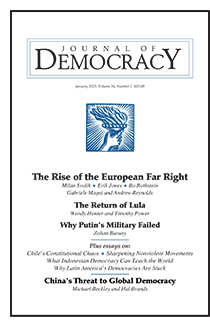
In Europe, Democracy Erodes from the Right
When ordinary voters are given a choice between democracy and partisan loyalty, who will put democracy first? Frighteningly, Europe harbors a deep reservoir of authoritarian potential.

Volume 34, Issue 1

When ordinary voters are given a choice between democracy and partisan loyalty, who will put democracy first? Frighteningly, Europe harbors a deep reservoir of authoritarian potential.
The government of Giorgia Meloni, the country’s first female prime minister, is popular, scary, and competent. Her far-right party also enjoys greater democratic legitimacy than any other Italian party in a long time.
The rising, far-right Sweden Democrats keep doing better in Swedish elections. They are now the country’s second-largest party, and their influence on Swedish political life has never been greater.
After long condemning gay rights, much of Europe’s political right now champions them. They have made welcoming gay voters a sign of modernity and openness—and a tool for stirring opposition to Muslim immigrants.

The Chinese Communist Party is deadly serious about its authoritarian designs, and it is bent on promoting them. It is time for the world’s democracies to get serious, too.

When Vladimir Putin launched a massive invasion of Ukraine, he expected an easy victory. Instead, the world has witnessed an object lesson in how a corrupt Russian regime crippled its own military power.
Indonesia is a leading example for fledgling democracies navigating tough transitions. But it is imperiled, and if it gives way, the loss for the democratic world will be enormous.
The record shows that movements using “dilemma actions”—creative protests that make a regime look foolish—are often more effective at undermining authoritarians. Activists should add such tactics to their toolkit.
Brazil’s charismatic former president is back, but there will be no honeymoon for the left. He won by a sliver, and his opponents on the right were empowered by the same election.
After two votes and a yearlong drafting process, Chileans rejected the progressive charter they had claimed to want. Right-wing attacks and voter anxiety are to blame. But can Chileans get it right?
This is the toughest time for Latin America’s democracies in decades. Democratic stagnation makes them ripe targets for illiberal populists and other would-be authoritarians who will feed the region’s worst vices.
Trillions of dollars are stashed in the world’s secret financial system, where they are keeping autocratic regimes afloat and fueling democracy’s decline.
McKinsey’s work is bankrolled by major corporations and governments around the world. How should the famous consulting firm choose the clients it represents and the projects it takes on?
Featuring Canadian deputy prime minister Chrystia Freeland’s remarks on defending democracy; a letter by Chinese and Hong Kong socialists on China’s “zero-covid” protests; Shervin Hajipour’s song “Baraye,” the unofficial anthem of the protests in Iran; Taiwanese president Tsai Ing-wen’s remarks on shoring up democratic resilience in Taiwan and globally; and Gambian human-rights lawyer Fatou Bensouda’s…